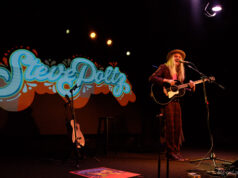The Mountain Goats (Photo by Spence Kelly)
John Darnielle, the singer and songwriter at the center of The Mountain Goats, has a lot of energy. That was more than evident in his performance at The Birchmere Friday evening. Throughout his set, he played his acoustic guitar not just as a stringed instrument but also, as he has described as a percussion instrument, and he went hard on it. His head shooked and bobbed, and his stage banter came out a fairly rapid pace.
On the podcast I Only Listen To The Mountain Goats, John explains that he has a diagnosis of anxiety, and he speaks quickly because — and this is a trap — the faster you talk, the sooner you’re done talking. Unfortunately, the faster both John and I speak, the more words we just keep packing in there.
Darnielle’s energy is apparent in his large body of work, too. AllMusic likely doesn’t have a complete account of all of his many recordings, but, since 1995, that site 22 albums. He also has four compilations of his early work, lo-fi solo recordings he made on a boombox. He’s also released a number of EPs. If this were the totality of his work, it would be impressive, but there’s more. He wrote the volume on Black Sabbath’s Master of Reality — he’s a huge metal fan — for the series 33 1/3. He’s also released 3 novels: Wolf In White Van, which was nominated for the National Book Award; Universal Harvester; and most recently, Devil House, which was nominated for the Edgar Award, which recognizes books in the mystery genre.
If ever there was a band and a person that *spoke* to me, it’s The Mountain Goats and John Darnielle. We shared many of the same interests: Growing up as nerds, both us read a lot of sci-fi and fantasy (and were particularly influenced by the late Harlan Ellison), played role-playing games, like Dungeons & Dragons, and watched a lot of professional wrestling. As a lyricist and a writer, Darnielle possesses the ability to make our obsessions, which are somewhat niche, compelling to people who might not normally be interested. A gentleman at my table Friday night, who’s never been a wrestling fan, told me how much he loves the concept album, Beat The Champ.
Darnielle included a song from that album, “Hair Match,” in Friday’s set. Of his own presentation, he said that, the louder a guy with an acoustic guitar sings and plays, people tend to think “he’s feeling it,” but truth is, “the quieter I get, the more I mean it.” “Hair Match” is sung at a relatively low volume, more restrained than much of the set. Introducing the song, he said, “Some of you are probably too cultured to have been to the matches.” He talked about the different kinds of gimmick matches one might if you one went. In a cage match, he explained, “The winner is the one who escapes the cage. If you can’t parse that metaphor, you’re hopeless.”
Watch The Mountain Goats perform “Hair Match” live for the Jordan Lake Sessions in 2021 on YouTube:
“Clemency for the Wizard King,” a cut from 2019’s In League With Dragons, is a fairly straightforward fantasy narrative. “There are infinite ways to introduce songs,” John told the audience, “but there are also two ways to introduce songs: directly and indirectly.” Most of the time, he said, he prefers the indirect method, but he opted here for the direct method, simply stating what the song is about: the supporters of aforementioned wizard king, seeking to free him.
In August, The Mountain Goats released their latest album, Bleed Out, a suite of songs inspired by ’80s action films. A lot of artists would focus on their latest material, but John only played “Bones Don’t Rust,” which is “a song about an assassin who has grown weary of assassinating.”
Prolific as he is, Bleed Out is only one of several albums he’s released since the pandemic forced him off the road in 2020. Getting Into Knives came out in October 2020. He explained that the band went to Memphis earlier that year to record an album, and had planned to make another in Muscle Shoals. On Getting Into Knives, they were joined by Charles Hodges, the organist for Al Green. At The Birchmere on Feb. 10, the set included the title track. Dark In Here, released less than a year later, is just as good; with so much material in his catalog, none of those songs made the set.
The set actually opened with an old song, “Going to Bogota,” released on the 1996 tape, Nothing For Juice. It’s part of a whole series of early songs entitled “Going To” (other entries visit Utrech, Georgia, Cleveland, Bolivia, Queens, Lebanon, Reykjavik, and Scotland). John has discussed writing these songs particularly about places that might not be seen as desirable as part of his recovery from substance abuse. “Wherever you go,” he learned, “there you are.” Any and every place, he argues, is or at least can be great, “though you’ll vibe more with some than others.” If you have a bad experience of a place, it’s likely because you brought your open baggage there, not because of anything that’s wrong with this place.
Stream “Going to Bogota” by The Mountain Goats on YouTube:
I pause here to interject a personal note: Darnielle is completely correct about this. Since high school, I’ve bounced from Ann Arbor, Michigan, to Oberlin, Ohio, to Austin, Texas, back to my hometown of Akron, Ohio, to College Park and Silver Spring, Maryland, and Sarasota and Tampa, Florida. I felt very unhappy in these places, but it had nothing to do with any features of these cities: I took a long to figure out how to live as a person on the spectrum, and I wouldn’t have enjoyed being anywhere until I got there. Learning to be a person with autism has some common ground with recovery: I’ve learned to focus on one day at a time, and, while there isn’t the same support group apparatus, it’s gotten easier as I’ve made connections with other people who’ve been down the same road.
When it comes to performing, Darnielle has said, he makes it about the audience, rather than about him. The more he gives, the more he’s able to take away. This echoes what I’ve heard from other artists and writers. Art, at least art you intend for other people to see or hear, is a form of communication. It’s about what you make other people feel, about allowing them to connect to the experiences and stories of someone else, to make them feel like they’re not alone, and to understand their struggles as part of the human condition we all share. Darnielle is a master of this and, when fans meet him, they often want to share deeply personal stories of their own trauma, which can sometimes be weird for him. What they really should talk to, he says, is the work that they relate to, which exists independently of him as a lyricist and composer.
The set continued with “Have to Explode,” then “If You See a Light.” “I wrote this is song in 2000,” John explained, “and it accurately predicted 2020.” He continued, “I’m just a fortune teller now.” He added, “Back when I was writing songs about crumbling couples, the songs got crueler as they progressed.”
Introducing “Soft Targets,” John distinguished the term from hard targets. In warfare, “hard” targets are infrastructure, while “soft” targets refers to human. “The sixth position,” he said, “is traditionally a song you haven’t heard.” In Friday’s set, this was a pre-97 tune, “Waving At You.”
Around this time, John’s accompanist, Matt Hughes, who played a variety of instruments, including piano, electric guitar, and soprano sax, left the stage, and he played a solo middle section, beginning with “Love Cuts The String.” After “I’ve Got The Sex,” John told the audience, “The old songs, if you really get into them, make you wonder if you’re okay.” (I’m good, JD.) “I don’t plan the middle section,” he said; he prefers to read the room and feel his way through it. The subject of silences came up, and he talked about, how in therapy, when he’s asked if he wants to “sit with” something for a moment, he says no. “You don’t have to torture me,” he continued, “I’ll tell you anything,” just as long as it means he doesn’t have to endure an awkward silence. All of this was preamble to an old song, “Alpha Sun Hat,” and he finished the solo section with “Twin Human Highway Flares.”
Hughes returned to the stage for “Lakeside View Apartment,” which John played piano on; while he writes most of his songs and mostly plays guitar, he does occasionally use the keys. (The album Goths has as almost no guitar on it.) The main set concluded with “Cotton” and “Up the Wolves,” from one of his finest albums, 2005’s The Sunset Tree. An explicitly autobiographical work — much of his catalog from the mid-2000s forward has been more autobiographical then his early material — it details his coming of age in Southern California in the late ’70s and early to mid-’80s, and, in particular his relationship with his abusive stepfather, who he dedicated the album to.
Watch The Mountain Goats perform “Up the Wolves” for the Jordan Lake Sessions on YouTube:
John and Matt left the stage to thunderous applause, then returned for a well-received encore. When they came back, John praised The Birchmere, calling it “a truly incredible club.” It’s a bit of a change for him to play there, as he typically prefers to play in venues where the audience stands, because he feels more energy from those crowds.
The first song in the encore, “Dance Music,” another track on The Sunset Tree, was recorded at Abbey Road Studios in England, which is most famous for the Beatles having worked there.
“Color in Your Cheeks” appeared on 2002’s All Hail West Texas, and tackles immigration through the idea of hospitality to strangers and the weary. It’s of a piece with John’s open relationship with Christianity; John is a progressive Christian, a man who finds in his deep faith a commitment to love and justice.
Getting toward the end of the evening, John said, “I’m fixed to play two more songs and most people in this room know what they are.” The first was “No Children,” from 2002’s Tallahasee, about a decomposing, alcoholic couple who end up in northern Florida. “It’s supposed to sound like a cocktail party,” he explained; it’s a song about parties for people who don’t like parties and find them depressing. After being featured in the final episode of the dark comedy series You’re The Worst, in unexpectedly became a Tiktok sensation, and the song became his most streamed track.
In becoming his most streamed track, “No Children” overtook “This Year,” a standout from The Sunset Tree that has long been a fan favorite. When The Mountain Goats appeared on Stephen Colbert’s late-night talk show, Colbert, who is a fan, sang it with the band. The song describes a Saturday morning in his teens — meeting a girl, playing video games, sneaking alcohol — but comes back around to the threat of his stepfather’s violence. While that might sound like am ominous way to end the show, it’s a hopeful song, with a chorus of “I am gonna make through this year, if it kills me.”
Singer-songwriter Lilly Hiatt opened the show with an excellent solo set. A second-generation musician, her father is John Hiatt, but Lilly’s work stands on its own for its quality. She’s received great critical response for her last three records, Trinity Lane, Walking Proof, and Lately. She opened with “Rae,” followed by “P-Town.”
Introducing “Trinity Lane,” a song about a street she lived on in East Nashville, Lilly admitted, “I get nervous” on stage. While Lilly is quite talented and a strong performer, it was an interesting contrast to see her followed by Darnielle, who has been doing this sort of thing for nearly 20 years longer. It takes a long to master stagecraft and presence, to grow out of those nerves, to become completely comfortable on stage. I have all the confidence in the world that Lilly will get there, that it’s just a matter of time.
Her set continued with a new song, “Bail,” followed by “Face.” She mentioned this his first time at the venue in three years, since she opened for Todd Snider just before the pandemic in March 2020. Her dozen-song set also included the Ride, the title cut of Walking Proof, “Brightest Star,” and what might’ve been a new song, ending with “Better.”







This is a thoughtful review of a show I enjoyed thoroughly. Thank you! However, I wanted to note that Matt Douglas is the sax player, while Peter Hughes is the bassist.